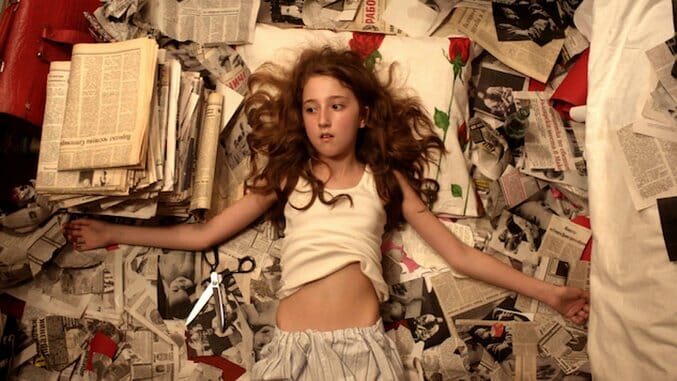
A coiled, slightly surrealistic drama that provides an impressionistic snapshot of particularly feminine pain and longing, debut director Maya Vitkova’s Viktoria reimagines maternal ambivalence as a metaphor for broader dislocation. The result, brittle and distinctive if rather overlong, is a tone poem that uses sociopolitical disadvantage to pry open the sympathies of an art house audience.
The story, set in the 1980s, follows three generations of women against the backdrop of the dissolution of the People’s Republic of Bulgaria, as the country lurches awkwardly toward democracy. More than just a reluctant mother-to-be, Boryana (Irmena Chichikova) very actively does not want to have a child. So when she gets pregnant with boyfriend Ivan (Dimo Dimov), it is shattering to her. Born without an umbilical cord (and thus no belly button) on the anniversary of Bulgaria’s socialist revolution, Boryana’s daughter Viktoria is heralded by Communist party leaders as the “baby of the decade,” the perfect symbol of an evolving country untethered to past problems.
A little less than one hour in, the film flashes forward to 1989, where now 9-year-old Viktoria (Daria Vitkova), having been showered with gifts and anointed a celebrity of sorts by the Communist regime, finds her privileged world thrown into disarray by the disintegration of the Eastern Bloc. This new reality forces Viktoria (played in her teenage years by Kalina Vitkova) and Boryana into greater conflict. It also draws Boryana’s own mother, Dima (Mariana Krumova), a stern and unloving Communist loyalist—“This is a party member, not a mom,” says Boryana)—back into relationships with her daughter and granddaughter.
Though powered by a touch of magical realism, Viktoria shares much in common with the minimalism of the recent Romanian New Wave—no great surprise, given that the movie is co-produced by Cristi Puiu. It commingles the personal and political in a very interchangeable manner, presenting its characters’ dilemmas and even inner feelings as inexorably linked to their surroundings. It is, however, a very specifically feminine vision (what other movie, for instance, peddles catharsis through a CGI-enhanced close-up of milk exploding from a lactating nipple?), delving into Boryana’s icy maternal indifference in a way few other recent modern films have.
Chichikova, who physically resembles Lizzy Caplan by way of St. Vincent, has an appealingly bedraggled look that is darkly beguiling; after the considerable lengths to which she goes to try to terminate her pregnancy early on, one spends a good portion of the movie pitched forward anxiously, wondering if/when Viktoria will tumble headlong into a tale of infanticide. The young actresses who portray Viktoria, meanwhile (both nieces of the director), have a quiet, relaxed watchability.
Some of the film’s allegorical elements remain obscure, or at least dance just beyond the fully immersed engagement of a Western audience. When Vitkova, at a couple points, pauses her film to present montages of geopolitical upheaval featuring a variety of international figures, one wishes she had found a way to more smoothly integrate this material, even if it was through clipped and distorted conversations about global news. As presented, these moments play like theatrical intermissions or mid-act stage changeovers, diluting the film of emotional currency when it should be gathering momentum.
Some moments have an undeniable sting, as when Boryana baits Ivan during an argument about paying more attention to their daughter by saying, “The way I got rid of all your babies before her?” only to be met with a slap. And when Vitkova’s film finally delivers a slightly older Viktoria it has mordant fun with both the self-regard of its namesake character and the turbulence she experiences. There’s a spritely tone to its second act that hints at something even looser and more absurdist. Overall, though, Viktoria lacks the sort of functional dramatic engine that would grant it deeper resonance and connection. Its 155-minute running time consequently feels bloated and repetitive, with certain sequences conveying essentially the same emotional point.
Still, the technical package that Vitkova assembles and orchestrates achieves a certain woozy, if cold to the touch, hold. The production design, which might most charitably be described as austere, appropriately communicates a material barrenness that matches Boryana’s fractured, isolated psyche, and cinematographer Krum Rodriguez trades in exacting, composed wide shots that reinforce this unmoored desolation. In the mirrored disinterest of Dima and Boryana, and its effects on those around them, Viktoria conveys the complex, charged mania of a fraught off-screen relationship (the film is presented as based on a true story, and dedicated to the director’s mother). Based on that element alone, many foreign film fans will likely find reward in this very particular work.
Director: Maya Vitkova
Writer: Maya Vitkova
Starring: Irmena Chichikova, Daria Vitkova, Kalina Vitkova, Mariana Krumova, Dimo Dimov, Georgi Spasov
Release Date: June 10 in Los Angeles
A superb parallel parker and Time Magazine’s 2006 Person of the Year, Brent Simon is a member and former three-term president of the Los Angeles Film Critics Association who can be followed on Twitter.